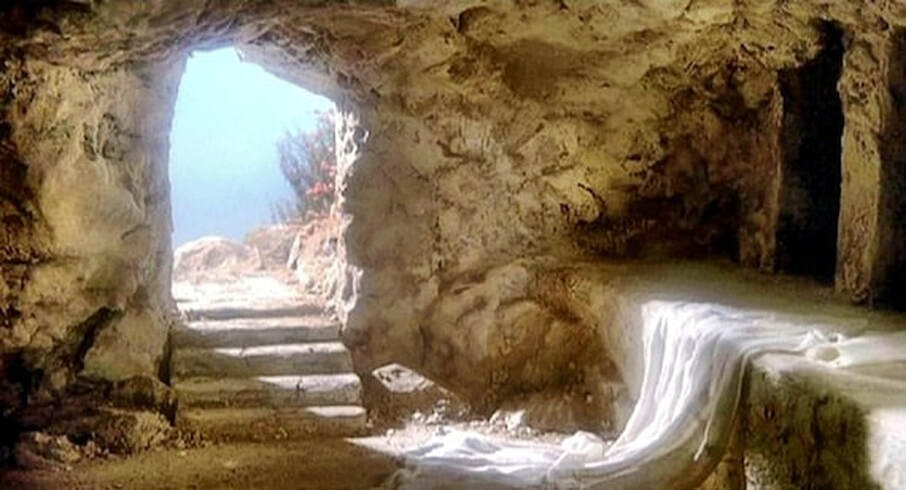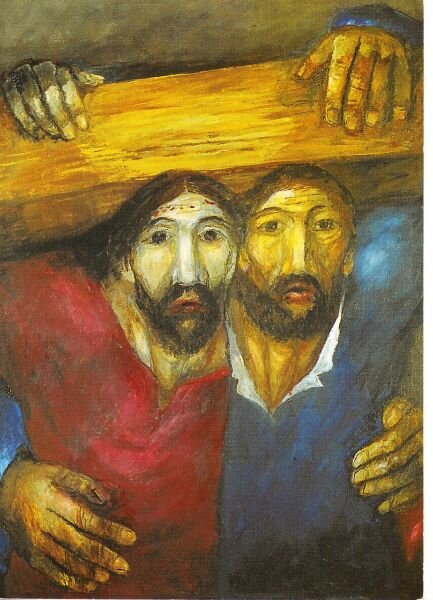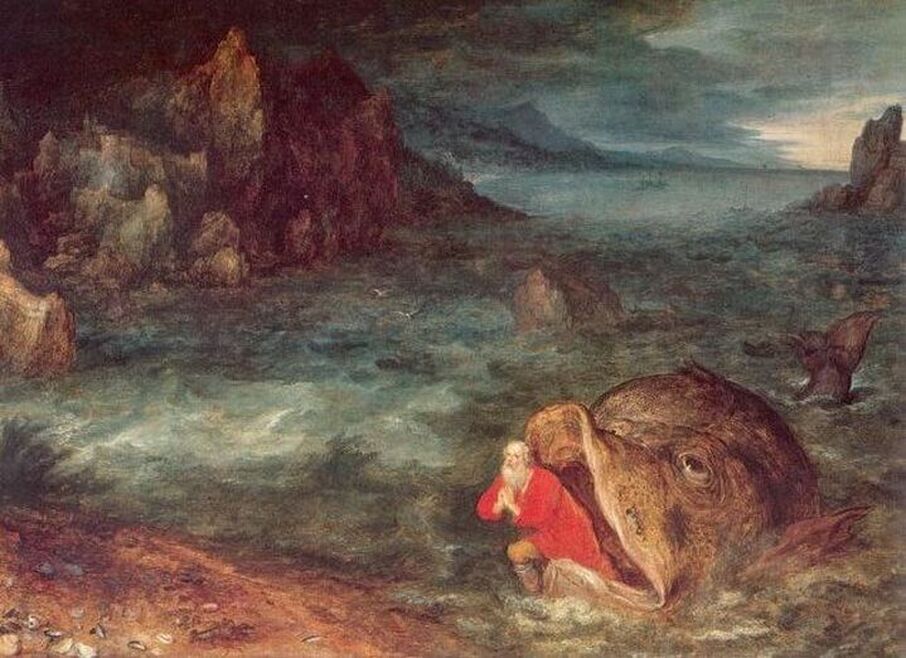|
16/4/2022 Easter Sunday “And when the Sabbath was past, Mary Magdalene, and Mary the mother of James, and Salome, bought spices, so that they might go and anoint him. And very early on the first day of the week they went to the tomb when the sun was risen” (Mk 16, 1-2). We can picture the women on their sorrowful mission. They move through the garden with heavy hearts, concentrated on the grim task that lies ahead of them, oblivious to all the sights and sounds and smells of the dawning spring morning. They are oblivious, above all, to the glorious presence of the risen Christ not a stone’s throw away from them. Their great concern is how they are going to roll back the heavy stone that seals the tomb “- it was very large” (Mk 16:4). Then they arrive at the tomb to find the stone rolled back, and an angel of the Lord seated upon it: “His appearance was like lightning, and his raiment white as snow” (Mt 28:3). The angels, or angels (Luke and John mention two), are alone in the tomb: there is no body. Only the linen winding cloths remain and, neatly rolled up, the napkin that covered the face. “Why do you seek the living among the dead?” the angels ask. Lord, we too have sought you too often among dead things. Lord, help us to realise that when we are weighed down with sorrow, anxiety or hopelessness, that you are no further from me than you were to the women in that dawn garden. Sadness and pain can blind us to the fact that your healing presence is beside us; can make us deaf to your voice calling us by name. “I have called you by name and you are mine”. How I can identify with Mary and the other women! I, too, have heard your words and did not understand. I have seen and did not perceive. I have experienced your redemptive love in my own past and failed to remember it. Wrapped in sorrow, I have passed you in my daily life without recognising you. I have trodden a dark and lonely path oblivious to your glory shining around me. I have made of my life a wasteland of unnecessary worry, when you have already removed the seemingly immovable obstacles that trouble me, rolling them back as effortlessly as you did the huge stone at the garden tomb. When I feel entombed in hopelessness, grant that - like Lazarus - I may hear you calling, "unbind her, and let her go". 9/4/2022 April 09th, 2022: Holy Week “Your enemies shall come fawning to you; and you shall tread upon their high places” (Deut 33:29). These are the last words of Moses. Because of his sin of unbelief and disobedience at Meribah, Moses is not permitted to lead his people into Canaan. However, immediately before his death, the Lord leads him to the top of Mount Pisgah and shows him the Promised Land. Now Jesus, whom Moses prefigured, is about to mount to a high place and open another Promised Land for all who had been excluded from it by the original sin of Adam. He who will free all enslaved by sin goes to a shameful form of execution reserved for slaves, subversives and criminals. He, whose power transcends any temporal power, is condemned to a death the spectacular cruelty of which is designed to reinforce the notion of the power of the state and the powerlessness of the individual. He will not climb this hill with the ‘hind’s feet’ of the Psalms; this ascent will be a stumbling, painful one. This is the ‘mountain of myrrh and the hill of frankincense’ (Sol 4:6): myrrh for burial, frankincense for embalming. “So they took Jesus, and he went out, bearing his own cross, to the place called the place of a skull, which is called in Hebrew Golgotha” (Jn 19:17). It may have been the crossbeam that Jesus carried, placed across His shoulders and with His arms bound around it; or it may have been the entire cross, laid heavily across one shoulder. Either way, the dragging weight on his torn flesh must impede His progress cruelly. At some point it was feared that, in his weakened state, Jesus might not survive his climb to Calvary. So “…they seized one Simon of Cyrene, who was coming in from the country, and laid on him the cross, to carry it behind Jesus” (Lk 23:26). The cross is laid on Simon against his will; indeed, we may assume that he bitterly resents his humiliating burden. Is Jesus - as so many of the sick, the incapacitated, the dependent - painfully aware of the reluctance with which Simon’s assistance is given? Already stripped of dignity by his suffering, he must be further humiliated by the obvious distaste with which Simon approaches his task. However, it is likely that the quality of Simon’s acceptance transformed the nature of the giving. We do not know whether Simon was Jew or Gentile; but we do know that his sons, Alexander and Rufus, will become sufficiently prominent in the young Christian church to be mentioned by Mark (Mk 15:21). Was Simon’s involuntary sharing of Christ’s suffering, then, a transforming experience? Did he, on accepting Jesus’ yoke, find, after all, that the yoke was easy and the burden light? “If anyone forces you to go one mile”, Jesus urged at the Sermon on the Mount, “go with him two miles.” A cross may be imposed by God. It may not be accepted willingly but if, at the end, it is accepted, then comes the grace for going the extra mile. Lord, how often have I shouldered your cross unwillingly! You have laid it on my shoulders and I have seen only the burden. I have seldom paused to reflect that, if the woman who touched Your garment in a crowd was instantly healed, how much more powerful might be the sharing of your own cross.  As the end of Lent approaches, I am reminded of the start of Lent. On Wednesday of the first week in Lent, the Old Testament reading was from the book of Jonah and in the Gospel for that day Christ himself referred to Jonah. I am sure I am not alone in associating Jonah with the whale, and only with the whale. The big fish which swallows Jonah seems to swallow the whole book of Jonah as well. Nothing prepared me for the surprises I found when I revisited the book of Jonah in recent years. This is a jewel of a book – vivid, unexpected, funny, dramatic and touchingly human. Above all, here is a prophet with whom one can identity far more easily than with his loftier peers. This is no Elijah, no Isaiah – but a cantankerous, self-absorbed, stubborn individual, impatient with others and knowing better than God what was good for him. I am hugely comforted by this curmudgeonly character! He is the only Minor Prophet whose mission takes place on foreign soil and to Gentiles. He is the only one of the Minor Prophets to be mentioned by Jesus. He is the only prophet to begin by refusing his mission. The opening three verses stopped me dead in my tracks: Now the word of the Lord came to Jonah the son of Amittai, saying ‘Arise, go to Nineveh, that great city, and cry against it; for their wickedness has come up before me’. But Jonah rose to flee to Tarshish from the presence of the Lord. Jonah did not do things by half measures. The repetition of the word “Tarshish” is significant. Tarshish is believed to have been in south-western Spain – the farthest westerly harbour for the ancient world. It was as far as he could possibly get from where God wanted him to go! In fairness, one could hardly blame him for his reluctance. The massive stronghold of Nineveh lay in the Assyrian empire – an empire notorious for its cruelty. Impaling, dismembering and flaying were common practice. For Jonah, Nineveh would have symbolised all that was wicked, vicious and heathen. While the prophets Elijah and Elisha healed and worked miracles among Gentiles, Jonah is the only Old Testament prophet charged with an entire mission to Gentiles. There has been nothing to prepare him for this; the pagans, with their idolatry and foul practices, were regarded as untouchables from the dawn of the Old Testament. It cannot have been hard for him to rationalise his refusal, with the weight of Mosaic Law behind him. We know from later events that he does not lack courage – it is outrage and not fear which motivates his resistance to God’s request. Why should these monsters be spared by a single act of repentance? Why should they not be made to realise – and pay for - the gravity of their offences? Like Jonah, I have had times of being appalled at what God seemed to be asking me to do. I rationalised my reaction by convincing myself that I must have misunderstood God’s message - unlike Jonah, who was in no doubt about what God was asking of him. “God can’t mean me to do this”, I told myself. “There’s no point in doing something if my heart isn’t in it. I can serve God much better in a different way.” Jonah undoubtedly felt that his particular talents would be much better employed at home, where his own people were sorely in need of guidance under a king who – while efficient –was also corrupt. Jonah and I were each missing the point. Jonah had scarcely left land when the Lord “hurled a great wind on the sea, and there was a mighty tempest on the sea, so that the ship threatened to break up.” What was Jonah doing in the midst of this tumult? “Jonah had gone down to the inner part of the ship and had lain down, and was fast asleep.” The captain comes to Jonah and cries “Why are you fast asleep? Arise, call upon your god!” Putting off a major task depletes our energy far more than action does. The knowledge of what we should be doing haunts us, no matter how hard we try to push it to the back of our mind. It lurks at the edge of our consciousness, draining the moment, devitalising the present. Jonah tells them they will have to throw him into the raging sea, which they reluctantly do. The sea is immediately still, whereupon the pagan sailors “feared the Lord exceedingly, and they offered a sacrifice to the Lord and made vows”. And in this unlikely way Jonah, running away from his mission to the Gentiles of Nineveh, makes his first Gentile conversions. “Then the word of the Lord came to Jonah the second time, saying 'Arise, go to Nineveh, that great city, and proclaim to it the message that I tell you..' So Jonah arose and went to Nineveh”. The miracle of his survival in the whale pales in comparison with what happened next. Jonah went into the great city of Nineveh and with eight words converted the entire population. “Yet forty days, and Nineveh shall be overthrown”. It is the shortest and most effective sermon on record. Nineveh repents, God spares Nineveh and Jonah is incandescent with rage. For modern readers the fish story is difficult to assimilate; we find the greatness of God’s mercy to Nineveh easier to accept. For Jonah it was the other way around. He didn’t want to go to Nineveh because he knew the power of his own preaching and he dreaded the possibility that the hated Assyrians would listen to him and be spared. While finding his own deliverance perfectly acceptable, he did not want God to extend the same generosity to people he judged as undeserving. To us, steeped in the cult of the individual, it is very easy to empathise with Jonah. He had an amazing talent, but he wanted to be the one to decide how best it should be used. It is as hard for us as it was for Jonah to accept that at times our roles will not be centre stage. Instead, we can be called upon to be a conduit through which God’s will is accomplished. Sometimes it doesn’t matter if our hearts are not in what we do – the fact that we do it can be enough for God to achieve astonishing results though us. So it was with Jonah, the most reluctant prophet in the Bible. Jonah begrudged God’s generosity in this instance. He went and sat outside the city, waiting to see what would become of it. Clearly, he hoped God would reconsider his decision to save it. Sometimes it is easier to observe legal specifics than to love. Sometimes it is easier to live within clearly defined limits than to let the Spirit fill the sails of our soul and take us where he will. Jonah did not have the benefit of Christ’s teaching to guide him, but he did have the word of God speaking unequivocally in his ear. The reverse is true for us. The end result is the same: we, like Jonah, must lift ourselves out of our comfort zone and obey the two greatest commandments. Luther describes Jonah beautifully, “This is, I think, a queer and odd saint who is angry because of God’s mercy for sinners…He does not even change when God punishes him for his unreasonable anger…and yet he is God’s dear child. He chats so uninhibitedly with God as though he were not in the least afraid of him, as indeed he is not; he confides in him as a father”. [1] Perhaps this is the secret of God’s patience with Jonah. Stiff-necked and contrary as he is, Jonah is nonetheless honest and courageous, unafraid to enter into a real dialogue with God. He is obedient in action but does not attempt to pretend that he is compliant in his heart. He is completely true to himself. Clearly, this is something God values. Nineveh repents and is saved on that occasion. That one moment in the city’s bloody history when it repented is preserved forever by by Christ, “The men of Nineveh will arise at the judgment with this generation and condemn it; for they repented at the preaching of Jonah, and behold, something greater than Jonah is here”. [2] That moment is made eternally present by Jesus and reminds us that nothing is entirely evil. If called, we must still go to Nineveh. It is no coincidence that the book of Jonah has been read for two thousand years at the Mishnah or afternoon service of Yom Kippur, the holiest and most solemn of Jewish holidays. This feast is the culminating point of the great season of repentance which starts with Rosh Hashanah, the Jewish New Year. The ten days between Rosh Hashanah and Yom Kippur are known as the “Days of Awe”. They are a time of introspection and repentance in which the sins of the previous year are contemplated and repented of. According to the Talmud, God opens three books on the first day of the year: one for the wicked, one for the good and the third for the large numbers who fall somewhere in between. The fate of the wicked and the good is determined on the spot; the destiny of the “in betweens” is suspended until Yom Kippur. Yom Kippur is the last chance to change the judgement, to demonstrate repentance and make amends before God’s “Book of Life” is closed and sealed until the following year. As Yom Kippur ends, a final service called “Nei’la” offers a last opportunity for repentance. It is the only service of the year where the doors to the Ark (where the Torah scrolls are stored) remain open from beginning to end of the service, signifying that the gates of heaven are open at this time. God, grant us the ability to see when the gates of heaven are open and the courage to enter while there is yet time. [1] Martin Luther, Lectures on the Minor Prophets: Jonah and Habakkuk (St Louis: Concordia Publishing House 1974) 91,92 [2] Lk 11:32 |
AuthorHelen Gallivan is co-founder with John Dundon of New Pilgrim Path. This blog is adapted from ther book, Dawn without Darkness, published by Veritas. Archives
April 2022
Categories |
 RSS Feed
RSS Feed